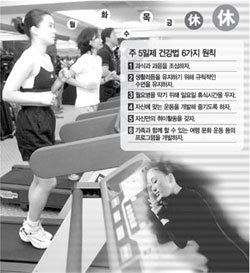Spend Two-day Weekends to Feel Healthy For the Whole Week
Spend Two-day Weekends to Feel Healthy For the Whole Week
Posted July. 11, 2004 22:32,

The five-day workweek has been introduced to government employees and companies of 1,000 employees or more.
As the weekend becomes longer, many experience life pattern changes. Some complain that they still feel very tired on Monday even after the two-day weekend. Perhaps their life pattern change was negative: their life cycle has been ruined.
Let us get some advice on how to spend the longer weekend more efficiently and some health tips from Doctor Hong Seung-bong of the Samsung Seoul Medical Centers Neuropsychiatric clinic and Professor Jing Young-su in the Sports Health Medical Center.
--You may go to bed late, but wake up at the usual time
Mr. Kim (32, Pungnap-dong, Songpa-gu, Seoul), an office worker, usually falls asleep around 11 p.m. and wakes up at 6:30 a.m. But ever since the five-day workweek system was implemented, he gets up after 11 a.m. on the weekend.
Consequently, Kim couldnt sleep at all the night before Monday, because he lost his usual sleeping pattern.
Many people go to bed late and wake up late to release the fatigue accumulated during the week, but waking up late leaves both body and brain feeling groggy. Sunlight interrupts sleeping and helps release the stress hormone in the body. That means it is best to wake up at ones usual time, even when you went to bed late the night before. Also, if you wake up but stay in bed for long, the rate of stress-hormone release increases and the pulse rate becomes rapid: that will prevent you from having a sound sleep.
If you happen to sleep in on Saturday, try to wake up at the usual wake up hour and spend some time doing physical activities such as working out and taking a walk, which will help you get back on track.
--Saturday should be a tough workout day.
Mr. Phi (33, Jingwanwoe-dong, Eunpyong-gu, Seoul) usually spends any off days from the work at a gym near his house. He also jogs 2-3 hours during the weekend. Then he would find himself having cramps and feeling exhausted. Obviously he crammed too much working out into the weekend, while not doing any during weekdays.
Cramming all of ones physical activities into the weekend will only make you even more tired.
A workout schedule should be evenly distributed over the whole week. In order to improve ones physical ability, working out three times a week for 30 minutes is better than working out once a week for 90 minutes.
If you play sports on the weekends, schedule high-intensity activities like long jogs, soccer, basketball and tennis on Saturday, and low-intensity activities like 30 minutes or less of jogging, badminton, or jumping rope on Sunday. Hiking is also best done on Fridays, Saturdays or, at the latest, by Sunday morning.
Beginners should choose a fun and enjoyable workout routine over a high-intensity one.
--Beat the off-day syndrome by spending it with family
Mr. Kim, a facility manager in a company (45, Sucho-gu. Sucho-dong, Seoul), goes to work at 7 a.m. and comes home after 9 p.m. He has to check every facility in his company every day, and that leads to long work hours.
Even on weekends, he could only feel relief after checking out things at work. The sudden implementation of the five-day workweek leaves him uncomfortable because he feels much more at home at work.
Workaholics like Mr. Kim have a high possibility of getting weekend syndrome. This syndrome is caused by the anxieties caused from having to leave the workspace and taking a break from work.
Patients of the syndrome often complain about muscle aches, headaches, indigestion and depression.
For these symptoms, setting up a program which can make the patient spend time with family on weekends is highly advisable. Talking to family or working out with them can even improve symptoms of depression. Setting up meetings with friends and family on weekends or spending time regularly on a hobby can also help.
Jin-Han Lee likeday@donga.com






![“설거지해도 그대로”…냄비 ‘무지개 얼룩’ 5분 해결법 [알쓸톡]](https://dimg.donga.com/c/138/175/90/1/wps/NEWS/IMAGE/2026/01/15/133164664.3.png)
